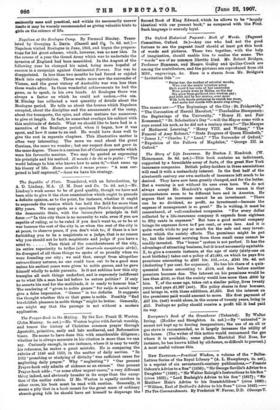Napoleon at the Boulogne Camp. By Fernand Nicolay. Trans- lated
by Georgian L. Davis. (Cassell and Cqr 7s. 6d. net.)— Napoleon visited Boulogne in June, 1803, and began the prepara- tions for his groat scheme, which, however, was no new ides. In the course of a year the Grand Army which was to undertake the *maims of gngland had been assembled. In the August of the following year he changed his mind, being more hopeful of success in a campaign against Continental Powers. Nor was he disappointed. In less than two months he had forced or cajoled Mack into capitulation. Three weeks more saw the surrender of Vienna, and the great victory of Austerlitz was won lees than three weeks after. In these wonderful achievements he had the game, so to speak, in his own hands. At Boulogne there was always a factor on which he could not reckon,—the sea. M. Nicolay has collected a vast quantity of details about the Boulogne period. He tells us about the houses which Napoleon occupied, about the discipline and the amusements of the camp, about the transports, the spies, and other matters too numerous to give at length. In fact, he somewhat overlays his subject with this multitude of details. What we should like to have had is a narrative of the Boulogne period, when it began, how it was spent, and how it came to an end. He would have done well to give the rest in separate chapters. This illustrative matter is often very interesting. The more we read about the great Corsican, the more we wonder ; but our respect does not grow in the same degree. There is a curious list of Corsican proverbs which were his favourite maxims. Two may be quoted as expressing his principle and his method. It mends a de chi se lo pigiic : "The world belongs to him who knows how to seize it,"—that sums up his theory of life. Homo audit(' d mum press° "A man sur- prised is half captured,"—here we have his strategy.










































 Previous page
Previous page